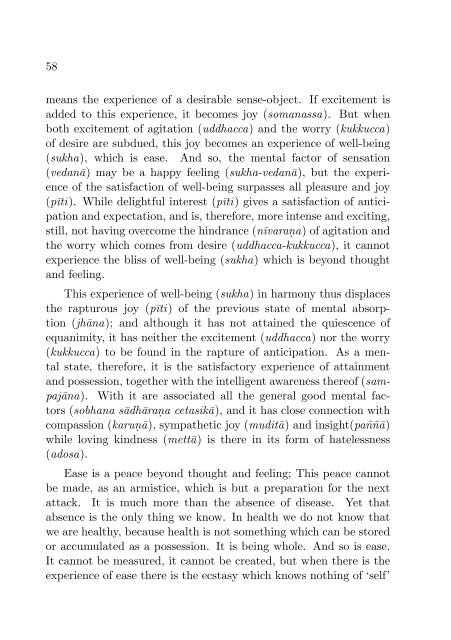Agony and Ecstasy
A comparative study of the five hindrances, together with the five states of concentration or mental absorption.
A comparative study of the five hindrances, together with the five states of concentration or mental absorption.
Create successful ePaper yourself
Turn your PDF publications into a flip-book with our unique Google optimized e-Paper software.
58<br />
means the experience of a desirable sense-object. If excitement is<br />
added to this experience, it becomes joy (somanassa). But when<br />
both excitement of agitation (uddhacca) <strong>and</strong> the worry (kukkucca)<br />
of desire are subdued, this joy becomes an experience of well-being<br />
(sukha), which is ease. And so, the mental factor of sensation<br />
(vedanā) may be a happy feeling (sukha-vedanā), but the experience<br />
of the satisfaction of well-being surpasses all pleasure <strong>and</strong> joy<br />
(pīti). While delightful interest (pīti) gives a satisfaction of anticipation<br />
<strong>and</strong> expectation, <strong>and</strong> is, therefore, more intense <strong>and</strong> exciting,<br />
still, not having overcome the hindrance (nīvaraṇa) of agitation <strong>and</strong><br />
the worry which comes from desire (uddhacca-kukkucca), it cannot<br />
experience the bliss of well-being (sukha) which is beyond thought<br />
<strong>and</strong> feeling.<br />
This experience of well-being (sukha) in harmony thus displaces<br />
the rapturous joy (pīti) of the previous state of mental absorption<br />
(jhāna); <strong>and</strong> although it has not attained the quiescence of<br />
equanimity, it has neither the excitement (uddhacca) nor the worry<br />
(kukkucca) to be found in the rapture of anticipation. As a mental<br />
state, therefore, it is the satisfactory experience of attainment<br />
<strong>and</strong> possession, together with the intelligent awareness thereof (sampajāna).<br />
With it are associated all the general good mental factors<br />
(sobhana sādhāraṇa cetasikā), <strong>and</strong> it has close connection with<br />
compassion (karuṇā), sympathetic joy (muditā) <strong>and</strong> insight(paññā)<br />
while loving kindness (mettā) is there in its form of hatelessness<br />
(adosa).<br />
Ease is a peace beyond thought <strong>and</strong> feeling; This peace cannot<br />
be made, as an armistice, which is but a preparation for the next<br />
attack. It is much more than the absence of disease. Yet that<br />
absence is the only thing we know. In health we do not know that<br />
we are healthy, because health is not something which can be stored<br />
or accumulated as a possession. It is being whole. And so is ease.<br />
It cannot be measured, it cannot be created, but when there is the<br />
experience of ease there is the ecstasy which knows nothing of ‘self’

















